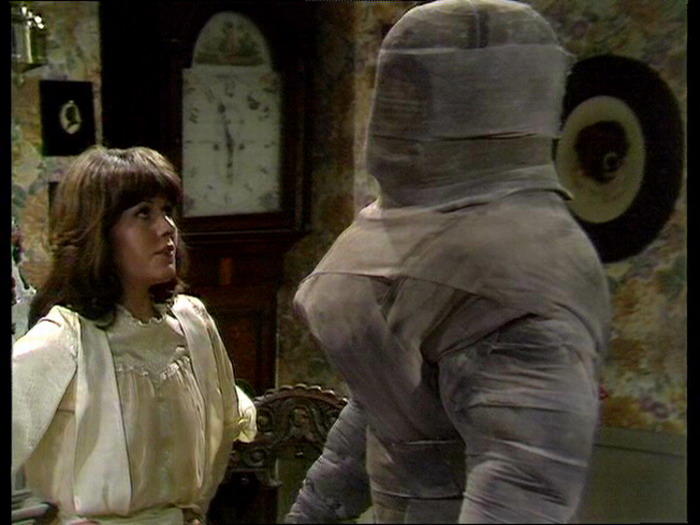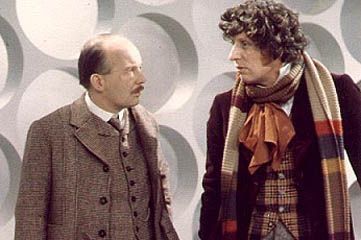 |
| "I will not laugh...I will NOT laugh...I will NOT laugh..." |
1) Cards on the table time--this is one of my all-time favorite Who stories overall, and easily the high point (with maybe only Robots of Death and The Talons of Weng-Chiang rivaling it) of what I consider to be the high point of the Classic series. This is a tightly written, clever, and scary little adventure that wastes very little in telling its tale.
2) And admittedly, one of the major reasons why I love this story so much is the strength of its villains. Sutekh is an amazing, monstrous character, a character so malevolent that you actually worry that The Doctor might lose, given such vivid life by Gabriel Wolff...and he doesn't fully appear until the last episode! But until he does, Bernard Archard's Scarman ably handles the bad guy duty as Sutekh's pawn, giving us two exceptional opponents for the Doctor and Sarah to come up against.
3) This is the penultimate serial in that tightly linked series of stories (it finally pays off when The Doctor and Sarah return to 1980 Earth in The Android Invasion.), and the way they link this serial to the previous one is fairly clever in that it serves to fill in more backstory about the show's mythology.
4) Another thing that's clever? The script by Robert Holmes and Lewis Griefer under the name 'Stephen Harris' manages to introduce links to previous serials (the dress Sarah wears--quite fetchingly, I might add--is referenced as belonging to Troughton era companion Victoria; she refers to one of the puzzles in the titular pyramid as being similar to one in the city of Exxilon from one of her Pertwee stories) in a subtle and non-obtrusive way. These act as 'easter eggs' for long time viewers without in any way alienating the newer viewers. It might be one of the reasons the Hinchcliffe era had some of the biggest ratings in the show's history, and one of the reasons this era was chosen to be syndicated internationally in the 80's.
 |
| And the scary thing is that this guy burning the Egyptian is only the second most frightening villain in this serial! |
5) Are the mummies kind of silly-looking? Yes, especially when they kill a poacher by squeezing him between their cleavage. Is the reason behind their being there still effective and cool? Damn straight.
6) It continues to amaze me how effortlessly Elisabeth Sladen and Tom Baker seem to work as a unit together. Their chemistry is so easy that they work like clockwork--Hell, their chemistry is even more apparent now that Ian Marter is gone, with a give and take that's just stunning. It doesn't surprise me to learn that some of this serial's interplay between the two was improvised on set. What's the most amazing is how, unlike with other companions, you never lose sight of the deep friendship these two have, even when they're yelling at each other. In her way, Sarah defines the Baker Doctor more than any other companion, much in the way Jamie defines the Troughton Doctor, Jo defines the Pertwee one and--as we'll see later--Ace defines the McCoy one.
7) Even though I don't like how he goes out--and even that serves a significant purpose in the serial, by giving us the reaction of someone not used to dealing with such horror on a daily basis--I really like Michaek Sheard's Laurnece Scarman. In particular, I really like how he's obviously a very, very smart man whose weakness is his love for his brother. The joy he has not only in showing off his radio telescope and discussing it with the Doctor, but in comprehending the Tardis so quickly makes him a fun and memorable character.
 |
| You can keep Leela and her Janis Thorns and Ace and her bombs...I'll take Sarah with a rifle any day... |
8) While the Baker propensity for comedy--this is the propensity that gets out of control under Graham Williams--is starting to make Sarah the butt of some jokes, whether intentional or unintentional, she is still far from the 'wailing frail' most Rose-sucking fans of the modern serial write her off as. Once again, she is trusted to help the Doctor enact his plans, primarily through shooting the gelignite and destroying the Osirian War Rocket. Even in the last episode, where Sarah does do some panicking, it's short (and she trusts the Doctor enough to calm down when he asks her to). There's a major difference between showing fear and being ineffectual in the face of that fear....
9) You know, I didn't realize this until I started watching these serials back to back, but one of the signatures of the Hinchcliffe era is great confrontations between The Doctor and his opponents. And the exchange between Sutekh and The Doctor that begins the fourth episode is so powerful, so engaging and deeply layered, that it remained in my head during all those years when Who was unavailable here in the New York market. It doesn't surprise me that Wolff (along with Michael Wisher) so defined villainy in the series that he was frequently used in the Big Finish audios and became the voice of The Great Beast in the 'Impossible Planet/Satan Pit two parter of the new series.
 |
| "What do you mean that after this conversation I'm going to become amewling puss?" |
10) I know much of the puzzles in the Pyramid of Osiris are kinda childish and relatively simple, but I dug the whole Indiana Jones-ish aspect of the Doctor working his way through the place....so much so that I never noticed the fact that that part of the fourth episode is just treading on water until they can spring the real solution on us.
Overall...a tight, exciting, flavorful little story that pretty much defines the Hinchliffe/Holmes era. There is very, very little to detract from its high entertainment value. Absolutely essential viewing for people who want to study the Classic era of Who!
No comments:
Post a Comment